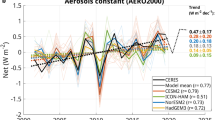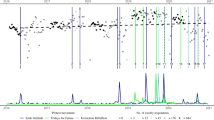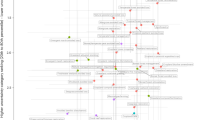Abstract
Effective mitigation of climate change will require deep international cooperation, which is much more difficult to organize than the shallow coordination observed so far. Assessing the prospects for effective joint action on climate change requires an understanding of both the structure of the climate change problem and national preferences for policy action. Preferences have become clearer in light of the United Nations Framework Convention on Climate Change Conference of the Parties in December 2015. Although deep cooperation remains elusive, many partial efforts could build confidence and lead to larger cuts in emissions. This strategy of decentralized policy coordination will not solve the climate problem, but it could lead incrementally to deeper cooperation.
This is a preview of subscription content, access via your institution
Access options
Subscribe to this journal
Receive 12 print issues and online access
$209.00 per year
only $17.42 per issue
Buy this article
- Purchase on Springer Link
- Instant access to full article PDF
Prices may be subject to local taxes which are calculated during checkout
Similar content being viewed by others
References
Kyoto Protocol (UNFCCC, 1997).
Paris Agreement (UNFCCC, 2016).
Victor, D. G. Global Warming Gridlock (Cambridge Univ. Press, 2011).
Jacoby, H. D. & Chen, Y. H.-H. Launching a New Climate Regime (MIT Joint Program on the Science and Policy of Global Change, 2015).
Krasner, S. D. Sovereignty: Organized Hypocrisy (Princeton Univ. Press, 1999).
Olson, M. Jr The Logic of Collective Action (Harvard Univ. Press, 1965).
Keohane, R. O. After Hegemony (Princeton Univ. Press, 1984).
Ostrom, E. Governing the Commons (Cambridge Univ. Press, 1990).
Drezner, D. W. All Politics is Global (Princeton Univ. Press, 2007).
Dietz, T., Ostrom, E. & Stern, P. C. The struggle to govern the commons. Science 302, 1907–1912 (2003).
Barrett, S. Environment and Statecraft (Oxford Univ. Press, 2003).
Sandler, T. Global Collective Action (Cambridge Univ. Press, 2004).
Axelrod, R. & Keohane, R. O. Achieving cooperation under anarchy: strategies and institutions. World Polit. 38, 226–254 (1985).
GHG Emission Time Series 1990–2012 per Region/Country (European Commission, 2014); http://edgar.jrc.ec.europa.eu/overview.php.
Putnam, R. D. Diplomacy and domestic politics: the logic of two-level games. Int. Organ. 42, 427–460 (1988).
Evans, P. B., Jacobson, H. K. & Putnam, R. D. (eds) Double-Edged Diplomacy (Univ. California Press, 1992).
Simmons, B. Mobilizing for Human Rights (Cambridge Univ. Press, 2009).
Davis, C. Why Adjudicate? Enforcing Trade Rules in the WTO (Princeton Univ. Press, 2012).
Axelrod, R. The Evolution of Cooperation (Basic Books, 1984).
Downs, G. W., Rocke, D. M. & Barsoom, P. N. Is the good news about compliance good news about cooperation? Int. Organ. 50, 379–406 (1996).
Yong, W. in China's Stakes in WTO Accession: The Internal Decision-making Process in China's Accession to the World Trade Organization (eds Holbig, H. & Ash, R.) 20–39 (Routledge, 2002).
Milner H. V. Interests, Institutions and Information (Princeton Univ. Press, 1999).
Broz, L. Congressional voting on funding the international financial institutions. Rev. Int. Organ. 3, 351–374 (2008).
Hafner-Burton, E. M. Forced to be Good: Why Trade Agreements Boost Human Rights (Cornell Univ. Press, 2009).
Bang, G. & Underdal, A. (eds) The Domestic Politics of Global Climate Change: Key Actors in International Climate Cooperation (Edward Elgar, 2015).
Bailer, S. & Weiler, F. A political economy of positions in climate change negotiations: economic, structural, domestic, and strategic explanations. Rev. Int. Organ. 10, 1–24 (2014).
Johnson, T. & Urpelainen, J. A strategic theory of regime integration and separation. Int. Organ. 66, 645–677 (2012).
Stewart, R., Oppenheimer, M. & Rudyk, B. A new strategy for global climate protection. Climatic Change 120, 1–12 (2013).
Stewart, R., Oppenheimer, M. & Rudyk, B. Building blocks for global climate protection. Stanford Environ. Law J. 32, 341–392 (2013).
Ostrom, E. A Polycentric Approach for Coping with Climate Change (World Bank, 2009).
Keohane, R. O. & Ostrom, E. (eds) Local Commons and Global Interdependence (Sage, 1995).
Carbone, J. C., Helm, C. & Rutherford, T. F. The case for international emission trade in the absence of cooperative climate policy. J. Environ. Econ. Manag. 58, 266–280 (2009).
Chayes, A. & Chayes, A. H. The New Sovereignty: Compliance with International Regulatory Agreements (Harvard Univ. Press, 1995).
Epstein, C. The Power of Words in International Relations (MIT Press, 2008).
Finnemore, M. National Interests in International Society (Cornell Univ. Press, 1996).
Finnemore, M. & Sikkink, K. International norm dynamics and political change. Int. Organ. 52, 887–918 (1998).
Ruggie, J. G. Multilateralism: the anatomy of an institution. Int. Organ. 46, 561–598 (1992).
Thompson, A. Management under anarchy: the international politics of climate change. Climatic Change 78, 7–29 (2006).
Tracking INDCs (Climate Action Tracker, accessed 7 January 2016); http://climateactiontracker.org/
Synthesis Report on the Aggregate Effect of the Intended Nationally Determined Contributions Note by the Secretariat (UNFCCC, 2015).
Hope, M. A detailed look at the US and China's historic climate deal. Carbon Brief (13 November 2014); www.carbonbrief.org/blog/2014/11/exploring-the-implications-of-the-us-and-china-historic-climate-deal/
The Intended Nationally Determined Contribution of the Kingdom of Saudi Arabia under the UNFCCC (UNFCCC, 2015).
Parson, E. A. Protecting the Ozone Layer (Oxford Univ. Press, 2003).
Hoffmann, M. J. Climate Governance at the Crossroads: Experimenting with a Global Response after Kyoto (Oxford Univ. Press, 2011).
Urpelainen, J. A model of dynamic climate governance. Int. Environ. Agreem.-P. 13, 107–125 (2013).
Hovi, J., Sprinz, D. F. & Underdal, A. in Toward a New Climate Agreement (eds Cherry, T. L. et al.) 167–180 (Routledge, 2014).
Nordhaus, W. Climate clubs: overcoming free-riding in international climate policy. Am. Econ. Rev. 105, 1339–1370 (2015).
Keohane, R. O. & Victor, D. G. The regime complex for climate change. Perspect. Polit. 9, 7–23 (2011).
Abbott, K. W., Green, J. F. & Keohane, R. O. Organizational Ecology and Organizational Strategies in World Politics (Harvard Kennedy School, 2013).
Falkner, R. A Minilateral Solution for Global Climate Change? On Bargaining Efficiency, Club Benefits and International Legitimacy CCCEP Working Paper No. 222 (London School of Economics, 2015).
Keohane, N., Petsonk, A. & Hanafi A. Toward a club of carbon markets. Climatic Change http://dx.doi.org/10.1007/s10584-015-1506-z (2015).
Martin, L. L. Coercive Cooperation: Explaining Multilateral Economic Sanctions (Princeton Univ. Press, 1992).
Sabel, C. F. & Victor, D. G. Governing global problems under uncertainty: making bottom-up climate policy work. Climatic Change http://dx.doi.org/10.1007/s10584-015-1507-y (2015).
Pathways to Deep Decarbonization: 2015 Report (Deep Decarbonization Pathways Project, 2015); http://deepdecarbonization.org/wp-content/uploads/2015/12/DDPP_2015_REPORT.pdf
Schelling, T. C. Some economics of global warming. Am. Econ. Rev. 82, 1–14 (1992).
Victor, D. G. et al. (eds) The Implementation and Effectiveness of International Environmental Commitments: Theory and Practice (MIT Press, 1998).
Aldy, J. E. The crucial role of policy surveillance in international climate policy. Climatic Change 126, 279–292 (2014).
Aldy, J. E. & Pizer, W. Alternative metrics for comparing domestic climate change mitigation efforts and the emerging international climate policy architecture. Rev. Environ. Econ. Pol. 10, 3–24 (2015).
Bodansky, D. M., Hoedl, S. A., Metcalf, G. E. & Stavins, R. N. Facilitating linkage of climate policies through the Paris outcome. Clim. Policy http://dx.doi.org/10.1080/14693062.2015.1069175 (2015).
Metcalf, G. & Weisbach, D. Linking policies when tastes differ: global climate policy in a heterogeneous world. Rev. Environ. Econ. Pol. 6, 110–129 (2012).
Johnson, N. The last holdout among big palm oil businesses joins no-deforestation pledge. Grist (5 December 2014); http://grist.org/food/the-last-holdout-among-big-palm-oil-producers-joins-no-deforestation-pledge/
Peters, G. P. et al. Rapid growth in CO2 emissions after the 2008–2009 global financial crisis. Nature Clim. Change 2, 2–4 (2012).
Stavins, R. et al. in Climate Change 2014: Mitigation of Climate Change (eds Edenhofer, O. et al.) Ch. 13 (IPCC, Cambridge Univ. Press, 2014).
Abbott, K. W. Strengthening the transnational regime complex for climate change. Transntl Environ. Law 3, 57–88 (2014).
Cole, D. H. Advantages of a polycentric approach to climate change policy. Nature Clim. Change 5, 114–118 (2015).
Green, J. Rethinking Private Authority: Agents and Entrepreneurs in Global Environmental Governance (Princeton Univ. Press, 2014).
Hadden, J. Networks in Contention: the Divisive Politics of Climate Change (Cambridge Univ. Press, 2015).
Bulkeley, H. et al. Transnational Climate Change Governance (Cambridge Univ. Press, 2014).
Hale, T. & Roger, C. Orchestration and climate change governance. Rev. Int. Organ. 9, 59–82 (2014).
Smith, P. et al. Biophysical and economic limits to negative CO2 emissions. Nature Clim. Change 6, 42–50 (2016).
Von Stechow, C. et al. Integrating global climate change goals with other sustainability objectives: a synthesis. Annu. Rev. Environ Resour. 40, 363–394 (2015).
Nye, J. S. Soft Power: The Means to Success in World Politics (Public Affairs, 2004).
Acknowledgements
We thank T. Dietz, M. Lane, J. Schot, R. Socolow, B. Sovacool, P. Stern and A. Underdal for comments, S. Solomon and M. Oppenheimer for related conversations, and L. Wong for research assistance. R.O.K. is supported by Princeton University. D.G.V. is supported by UC San Diego, the Electric Power Research Institute, The Brookings Institution and the Norwegian Research Foundation.
Author information
Authors and Affiliations
Contributions
R.O.K. and D.G.V. contributed equally to conceiving the article, the analysis and writing.
Corresponding author
Ethics declarations
Competing interests
The authors declare no competing financial interests.
Rights and permissions
About this article
Cite this article
Keohane, R., Victor, D. Cooperation and discord in global climate policy. Nature Clim Change 6, 570–575 (2016). https://doi.org/10.1038/nclimate2937
Received:
Accepted:
Published:
Issue Date:
DOI: https://doi.org/10.1038/nclimate2937
This article is cited by
-
Political strategies for climate and environmental solutions
Nature Sustainability (2023)
-
National models of climate governance among major emitters
Nature Climate Change (2023)
-
Classifying different national approaches to climate governance
Nature Climate Change (2023)
-
An urban take on sustainable development policies and corresponding positioning strategies
npj Urban Sustainability (2023)
-
Institutional roots of international alliances: Party groupings and position similarity at global climate negotiations
The Review of International Organizations (2023)



